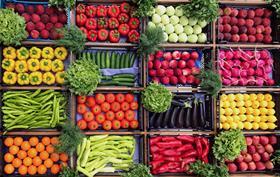
Greenyard has today (14 September) published its fourth Sustainability Report and introduced its Sustainability Roadmap for 2025.
According to the company, its approach for the coming years is built on three key pillars and includes a new ambitious set of
commitments, 'enabling it to further accelerate its sustainability journey and embrace its responsibility to be a driving force to improve life'.
'The impact of climate change is undeniable,' Greenyard stated. 'More than ever before, we are confronted with extreme weather
conditions, droughts, heat waves and declining biodiversity. Yet, everyone can directly, and easily, contribute to a more sustainable food value chain.
'If we want to continue feeding the world’s growing population, while respecting the natural boundaries of our planet, a shift towards a more plant-based diet is the only way forward. It is an elementary part of the solution. As a global leader in supplying fruit and vegetables, and together with its customers and growers, Greenyard aims to make a significant and positive impact on this transition.'
Three pillars
Greenyard’s Sustainability Roadmap is built on three pillars that it has said were crucial to creating more sustainable food value
chains, crafted around the fork-to-field concept.
The first pillar is building sustainable food supply chains, ensuring the highest environmental and social standards, meaning good and fair working conditions for all workers in the value chain while taking good care of the planet.
The second pillar is improving Greenyard’s environmental footprint, working towards a lower carbon and water footprint. 'Fruit and vegetables have an exceptionally low carbon footprint and lower water consumption compared to other food categories,' the company pointed out. 'Still, Greenyard continuously works on reducing greenhouse gas emissions and limiting water footprint, throughout the entire value chain.'
Finally, Greenyard's third pillar is teaming up with its customers, promoting healthy and sustainable food concepts. The group said that only by teaming up with its customers, and connecting them to its growers, can it make a real difference.
“Today, there is an increased awareness of healthier lifestyles and a growing attention for sustainability as an integral part of the health equation,' noted Hein Deprez, co-CEO Greenyard. 'For Greenyard, this has been part of our DNA since we started.
'We are right in the centre of this reality,' he continued. Our unique position in the food value chain brings opportunities. It allows us to leverage on the business we have built over the past decades: we deliver plant-based products to consumers, based on their needs, and driven by health and sustainability.
'It also comes with a major responsibility,' Deprez explained. We want to be a catalyst for change towards ever more sustainable food value chains. We embrace both, we raise the bar, and we are confident we will meet our ambitious sustainability targets and deliver on our promise to improve life: for people and for nature.”
Green targets
The group outlined how each of these pillars had been translated into tangible targets, based on the commitments Greenyard has already been working on.
These include areas such as climate change, where it is aiming for a 50 per cent reduction of its CO2 emissions by 2025 compared to 2019, and the development of a net zero strategy by 2050.
Greenyard is also looking to minimise food waste through the reduction of any avoidable food waste in its own production by 25 per cent by 2025 (and 50 per cent by 2030), and lower the water footprint of fruits and vegetables.
Minimising the environmental footprint of its packaging and ensuring responsible and sustainable sourcing are also on the agenda.
“To come to a truly sustainable solution, we need everyone in the food value chain,' said Marc Zwaaneveld, co-CEO Greenyard. 'Part of the solution lies with the end consumers: they will also need to recognise the actual value of fresh produce, for their health and for the planet. It is part of our responsibility – together with our customers – to inspire, educate and convince them to pay a fair, inclusive, and true price for their products.
The transition to more sustainable food production will simply require investments from our generation, to safeguard our planet for future generations,' he added. 'Guided by our ambitious Sustainability Roadmap and by the nature of our products, we are dedicated to actively driving this change, for the better.”



